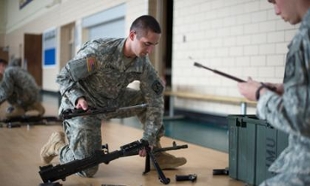Mission is secret, but team is ready
News
Eleven JMU Army ROTC Duke Battalion cadets are embarking on an unknown mission with one goal in mind – to represent the university and the 4th Brigade well at the 2014 Sandhurst Military Skills Competition.
The elite group, The Ranger Challenge Team, is already making history by being the first JMU team to compete in the prestigious annual competition held at the U.S. Military Academy at West Point. The April 11-12 competition, hosted by the United States Corps of Cadets, will test the skills of 60 teams from military service academies around the world.
There the team will match extreme physical training with keen critical thinking skills to complete assignments that will call for expertise in marksmanship and weapon handling, land navigation, obstacle courses and other challenges, all in full gear with packs weighing up to 60 pounds.
JMU’s team earned the right to compete by virtue of winning the October 2013 competition with 40 other college and university teams making up the 4th Brigade, one of eight Cadet Command brigades represented at the West Point competition.
While the missions the cadets will undertake at Sandhurst are secret until revealed to them once they convene at West Point, the JMU team is benefiting from its Department of Military Science cadre members (faculty) who have Ranger School experience in the U.S. Army. “Our cadre really trains us above and beyond everyone else,” said Ranger Commander Zak Knowles.
Since November Knowles and Ranger Challenge members James Caron, Rob Chuckney, John Cundiff, Katelyn Dills, Cameron Lucas, Ben Miller, Jackson Snyder, David Wilson and alternates Garrett Mannion and Erin Pace have been training to achieve levels above and beyond ROTC standards. Instead of reporting for physical training three days a week, the Rangers train five days a week from 5:20-7 a.m. Then it's off to ROTC classes two days a week, lab once a week and further training to meeting requirements such as running five miles in less than 40 minutes, completing a 12-mile ruck march in three hours, maneuvering with full gear on a one-rope bridge or through water.
“For me, training in our gas masks was the most challenging part of preparing for Sandhurst,” said Dills. “Eric Thomas, former football athlete, once said, ‘If you want to succeed as bad as you want to breathe, then you will be successful.’ That quote has encouraged me to push past all the challenges I face in training, in competition, in life.”
The physical training comes easier for Cundiff. “I would have to say that the most grueling part of preparing for Sandhurst would be the mental aspect of it all,” he said. “You need to know the academic side of the competition, and study and memorize that in a way that when it’s time for the competition you don’t even need to think about it and can just perform it.”
“I believe the most grueling parts of preparing for the Sandhurst Competition are not the events themselves, rather the balancing of those training events with school work, class conflicts with training time and other ROTC duties,” said Wilson. Knowles agrees, nothing that a cadet’s grade point average counts 40 percent in the criteria for determining standing with the cadet structure.
This winter’s snows, which have played havoc with JMU’s class schedule, have also made preparing for the Sandhurst Competition difficult. For Commander Knowles, “Being able to plan training events throughout this crazy weather we have been having” has been the most grueling part of preparing for the Sandhurst Competition. “A lot of our training events this semester have been canceled due to the amount of snow we have received here at JMU.”
But despite the hardships, the team is ready for the mission at West Point. “Everyone pulls their own weight and contributes to the team equally with their individual strengths and skills. Some people are better at assembling weapons and radios, some are better at mental tasks, some are better at medical skills, and others can go for days physically,” said Chuckney. “We all bring certain skills to the table that make our team better and we teach each other these skills so that we can all become proficient at them and make it enjoyable rather than ‘grueling.’”
Lt. Col. Richard Showalter, professor and head of the Department of Military Science, Master Sgt. Jeremy Wilcox and Capt. Andrew Ware will accompany the team to West Point. Showalter said, “The value of the Sandhurst Competition for JMU’s Ranger Group is in the preparation leading up to the event. The training opportunities with weapons, Army tactics and skills have increased their capability to lead America’s soldiers and become better officers.
“Additionally, during the course of their preparation, they have developed a bond of trust and camaraderie amongst their teammates that is unrivaled in any sport. Sandhurst will showcase this hard work, teamwork, dedication to excellence and their indomitable spirit that both cadre and cadets have put into preparing the team to represent JMU and 4th Brigade for this two-day event.”
“Everyone is capable of executing for Sandhurst. It’s just making sure we use good critical thinking and avoid penalties that could jeopardize whether we win or lose,” Knowles said. “We’re going to win; that’s what we’re expecting.”
# # #

